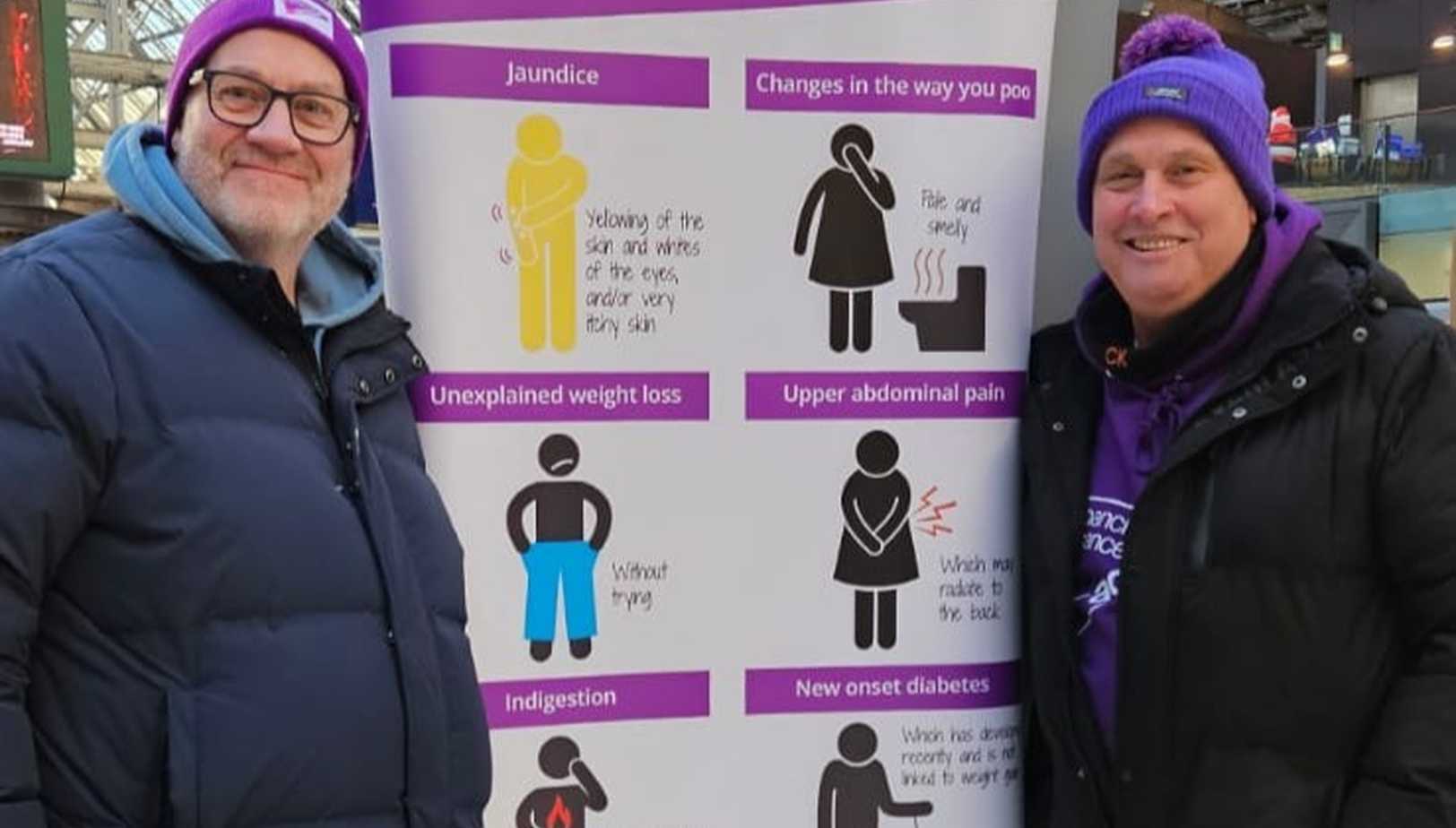Andrew Fernie's story
- Posted: 25 November 2025
- 4 min read
People must have thought I looked like Bart Simpson.
Andrew Fernie shares his journey with pancreatic cancer
When he set out on a solo cruise from New York to the Bahamas in the summer of 2023, Andrew Fernie just wanted a break. The 57-year old delivery driver from Kinglassie, Fife, had spent decades lifting fruit and veg boxes across Tayside and Angus. But a few days into the trip, standing in front of the cabin mirror, he realised something was wrong.
"I wasn't quite feeling myself," he recalls.
"I looked in the mirror and my eyes were yellow. I knew right then it wasn't normal."
The ship's doctor took one look and urged him to go straight to hospital. But the cost - $10,000 just to be admitted - made Andrew hesitate. He decided to wait until he got home. "I know it sounds crazy, but that sort of money would've crippled me," he says. "I felt rough for a few days, then better. But the jaundice had spread through my whole body. People must have thought I looked like Bart Simpson."
Nine days later, Andrew flew back to Scotland and headed straight to his GP in Glenrothes. He barely had time to sit down before the doctor fetched him from the waiting room and phoned for an ambulance.
"They took me in straight away," he says. "I spent a week in a local ward, then three weeks at the Edinburgh Royal. They said my bile duct was blocked and I'd need some tests."
Those tests revealed the truth: several growths, including a tumour attached to his pancreas measuring roughly 76cm long. The news hit like a hammer.
"I had actually googled the symptoms on the cruise," Andrew says. "The first thing that came up was pancreatic cancer. But I didn't want to believe it."
When the diagnosis came, his first question was how long he had. "I told the surgeon I thought maybe two or three years," he says. "He said it was more like four or five months. I was stunned."
Even so, there was a glimmer of hope. Surgeons decided to attempt the Whipple Procedure - an enormous, complex operation that removes part of the pancreas, small intestine, gallbladder, and bile duct. It lasted 15 and a half hours.
"The surgery itself was a success at first," Andrew says, "but two weeks later I fell ill again. The pipe connecting my liver had burst. I went through more procedures after that, plus infections, plus chemo. It was a rough road."
Throughout the ordeal, one thought kept him going. "At the darkest moments, I thought of my son and my granddaughter," he says softly. "I could picture them standing at a finishing line, waiting for me. That image kept me alive."
Andrew's case had been serious enough for doctors to consider it stage four pancreatic cancer. "I've met people with the same illness who weren't candidates for surgery," he says. "I'm one of the lucky ones."
The "luck" word comes up a lot when Andrew talks about his recovery. After months of chemotherapy and complications, his consultant recently delivered extraordinary news: he's in remission.
"Originally they said the operation and chemo would just prolong my life," he says. "To be told I'm in remission... I can't describe it. I'll only need an annual check-up from now on."
That good news gave Andrew a new drive. Earlier this year, while recovering his strength, he spotted an online advert for a charity hike supporting Pancreatic Cancer Action Scotland. Without overthinking it, he signed up.
"Before all this, I'd only walk on a golf course," he laughs. "But I decided to give it a go. At first I could only walk a mile or two. Now I do about eight miles a day."
His tally this week alone stands at 60 kilometres - nearly 37 miles - with his latest stop at Bishop Hill near Loch Leven.
"I get up early, pack a rucksack with snacks, put on my ear pods and just go," he says. "It takes maybe four hours each time, plenty of time to think. It clears my head."
Those walks have become more than exercise. They're a statement of survival, a way to reclaim control after cancer reshaped his life. Doctors have advised Andrew to avoid lifting heavy loads, meaning his days driving and delivering crates are behind him. But he's swapped one kind of work for another: volunteering, fundraising, and walking to raise awareness.
This winter he plans to start tackling the Munros and, if all goes well, visit the Outer Hebrides. "I want to see as much as I can while I've got this second chance," he says.
Andrew has also started creating a memory box for his granddaughter - filled with photos, notes, and mementoes - something personal she can keep for ever.
"Even if I'm not around one day, I want her to have something to know who I was," he says.
Yet for all the hope in his story, Andrew doesn't sugar-coat what he's been through. "There were times in hospital I didn't think I could keep going," he admits. "But if I'd sat at home feeling sorry for myself afterwards, I'd have given up.
"If I had to give a message to other people it would be to keep on going, even when you think you can't."
